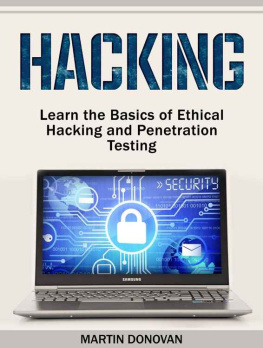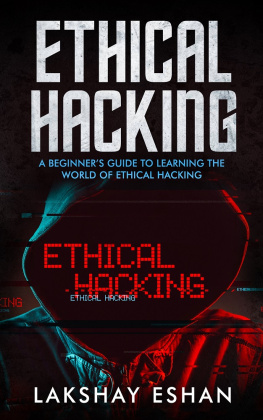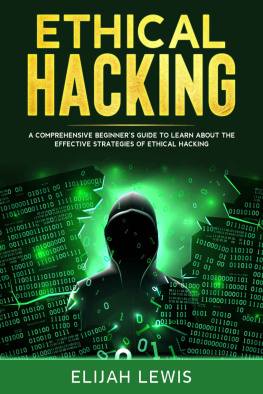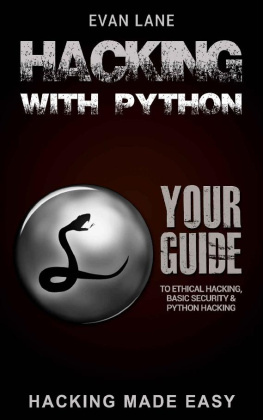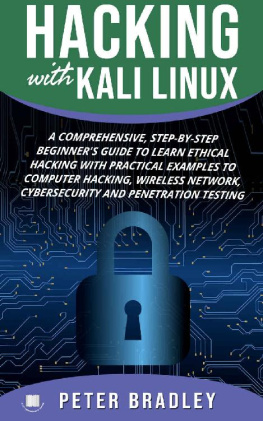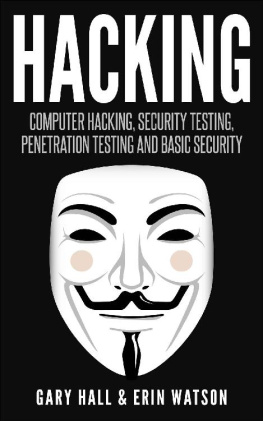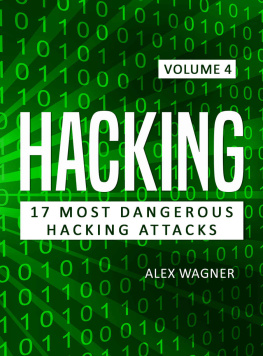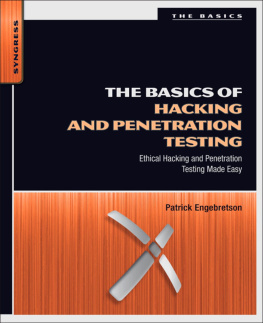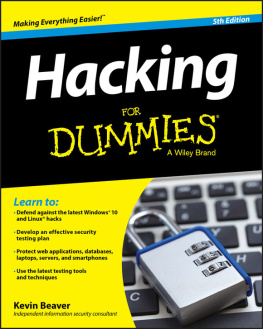Donovan - Hacking: Learn the Basics of Ethical Hacking and Penetration Testing
Here you can read online Donovan - Hacking: Learn the Basics of Ethical Hacking and Penetration Testing full text of the book (entire story) in english for free. Download pdf and epub, get meaning, cover and reviews about this ebook. year: 2016, genre: Business. Description of the work, (preface) as well as reviews are available. Best literature library LitArk.com created for fans of good reading and offers a wide selection of genres:
Romance novel
Science fiction
Adventure
Detective
Science
History
Home and family
Prose
Art
Politics
Computer
Non-fiction
Religion
Business
Children
Humor
Choose a favorite category and find really read worthwhile books. Enjoy immersion in the world of imagination, feel the emotions of the characters or learn something new for yourself, make an fascinating discovery.
Hacking: Learn the Basics of Ethical Hacking and Penetration Testing: summary, description and annotation
We offer to read an annotation, description, summary or preface (depends on what the author of the book "Hacking: Learn the Basics of Ethical Hacking and Penetration Testing" wrote himself). If you haven't found the necessary information about the book — write in the comments, we will try to find it.
Hacking: Learn the Basics of Ethical Hacking and Penetration Testing — read online for free the complete book (whole text) full work
Below is the text of the book, divided by pages. System saving the place of the last page read, allows you to conveniently read the book "Hacking: Learn the Basics of Ethical Hacking and Penetration Testing" online for free, without having to search again every time where you left off. Put a bookmark, and you can go to the page where you finished reading at any time.
Font size:
Interval:
Bookmark:
Hacking
Learn the Basics of Ethical Hacking and Penetration Testing
Table of Contents
Copyright Notice
Copyright 2015 by Martin Donovan - All rights reserved.
This document is geared towards providing exact and reliable information in regards to the topic and issue covered. The publication is sold with the idea that the publisher is not required to render accounting, officially permitted, or otherwise, qualified services. If advice is necessary, legal or professional, a practiced individual in the profession should be ordered.
- From a Declaration of Principles which was accepted and approved equally by a Committee of the American Bar Association and a Committee of Publishers and Associations.
In no way is it legal to reproduce, duplicate, or transmit any part of this document in either electronic means or in printed format. Recording of this publication is strictly prohibited and any storage of this document is not allowed unless with written permission from the publisher. All rights reserved.
The information provided herein is stated to be truthful and consistent, in that any liability, in terms of inattention or otherwise, by any usage or abuse of any policies, processes, or directions contained within is the solitary and utter responsibility of the recipient reader. Under no circumstances will any legal responsibility or blame be held against the publisher for any reparation, damages, or monetary loss due to the information herein, either directly or indirectly.
Respective authors own all copyrights not held by the publisher.
The information herein is offered for informational purposes solely, and is universal as so. The presentation of the information is without contract or any type of guarantee assurance.
The trademarks that are used are without any consent, and the publication of the trademark is without permission or backing by the trademark owner. All trademarks and brands within this book are for clarifying purposes only and are the owned by the owners themselves, not affiliated with this document.
Disclaimer
While all attempts have been made to verify the information provided in this book, the author does not assume any responsibility for errors, omissions, or contrary interpretations of the subject matter contained within. The information provided in this book is for educational and entertainment purposes only. The reader is responsible for his or her own actions and the author does not accept any responsibilities for any liabilities or damages, real or perceived, resulting from the use of this information.
Ethical hacking is a way to turn your mischievous thoughts into legal work that pays quite well. Businesses will pay you generously to do what malicious hackers want to do to access their systems and steal valuable information. You wont steal the information, however. When you find vulnerabilities, you will report them to the IT departments of the companies for which you work, so that they can repair the problems.
Ethical hacking, also known as white hat hacking, is a way for organizations to ensure that they are compliant with government and corporate mandates, to keep customers information safe and private. Youll learn all the tools of the hacking trade, both automatic and dynamic, so that you can keep your employers as safe as they possibly can be against hacker attacks and information breaches.
BONUS: Your FREE Gift

Thank you for purchasing my book: " Hacking ". I want to show you my appreciation by offering an exclusive Special Report TOP 10 Gadgets Of The Year for FREE.
Simply Click the Button Below

OR Go to This Page
http://bit.ly/1AiwLLM
Computer hacking can occur in many ways. The intent may be malicious or benign. Benign hacking by workers in the security industry is called ethical hacking, which describes attacking a public or private network or system benevolently, to check on the security of the system or network for its owners. Ethical hackers may sometimes be referred to as white hat hackers. This distinguishes them from people who hack into systems with the intent of harm or exploitation. Those are black hat hackers.
One not-so-clear part of hacking is known as hacktivism. In these cases, a hacker will detect and report on security vulnerabilities, but may also exploit them for social activism. In cases like these, sometimes called gray hat hacking, the hacker may not be motivated by money, but rather the goal of calling attention to injustices or issues that the hacker feels merit social change. The victim may not be as receptive of the message.
True ethical hacking should be done with the consent of the organization being targeted, even though some black hat hackers may claim to be working as ethical hackers if they are caught.
Why do Companies Use Ethical Hackers?
Why would someone pay a hacker to attack their own website or application? The reason is to expose any vulnerability they may have. Anyone in law enforcement knows that in order to prevent criminal activity, its best to think like criminals do. Ethical hackers who test security systems use methods just like illegal hackers do, but instead of disrupting the company, they report any problems they find.
The Federal government utilizes many ethical hackers. Larger companies employ entire teams of white hat hackers as part of their plans for information security. If you are tech savvy, or a computer programmer, you can take classes that will help you learn ethical hacking, and you can even be certified in the skills.
Application testing utilizes ethical hackers who try to compromise an app and then report their findings. Various tests are performed, including information gathering attempts, all the way up to outright attacks that would damage a company or agency if they were done maliciously. Ethical hacks may include techniques like emailing company staff to see if they will reveal their passwords or other details of their accounts.
Ethical Hacking Tools
Ethical hackers use tools that expose vulnerabilities like software coding errors that are threatening to accounts, critical data and the functionality of the applications. Some of this hacking is done manually and some is done with automated tools, like dynamic and static analysis. These will find insufficient encryption or malicious code that could allow security breaches. Ethical hackers can spend time prioritizing problems and remediating them.
Companies find Ethical Hackers Valuable
Large companies have used ethical hackers for many years to test their internal and external security. They are especially valuable in checking new systems being launched. Beyond their testing, they can find overlooked vulnerabilities that could bring damage to the company.
Businesses hire white hat hackers, never black hat hackers. Black hat hackers attacking their systems may very well find vulnerabilities, but they will also take advantage of them.
Most companies find it quite safe to employ white hat hackers, whose skills are used to improve security. They will have the explicit permission of management, and they will test their systems just as if they were malicious hackers. They can perform vulnerability assessments, quantify risks and threats, and disclose their findings so that the problems can be repaired.
If you enter white hat hacking, you will use most of the same tools as malicious black hat hackers do. You will need to train in the area, and keep your knowledge and skills up to date, so that you know the latest exploit possibilities. You do not need to be certified after you train to do white hat hacking, but it will put company managers at ease when they hire you.
Font size:
Interval:
Bookmark:
Similar books «Hacking: Learn the Basics of Ethical Hacking and Penetration Testing»
Look at similar books to Hacking: Learn the Basics of Ethical Hacking and Penetration Testing. We have selected literature similar in name and meaning in the hope of providing readers with more options to find new, interesting, not yet read works.
Discussion, reviews of the book Hacking: Learn the Basics of Ethical Hacking and Penetration Testing and just readers' own opinions. Leave your comments, write what you think about the work, its meaning or the main characters. Specify what exactly you liked and what you didn't like, and why you think so.

